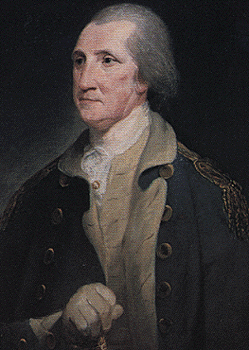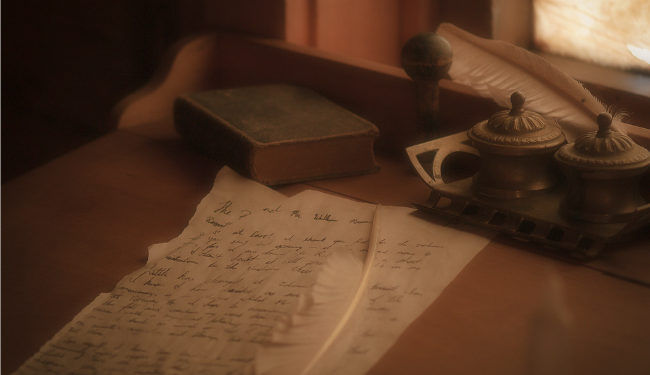 Read some of our Latest articles.
Read some of our Latest articles.
When I went to India with Jerris twenty years ago, I knew there would be culture shock. I was not prepared for the intensity of it, but I knew it was coming and so I planned for it. I had three coping mechanisms: photos of my wife and daughters, the music of Gene Autry (I took cassettes), and the short stories of Mark Twain. These three connections to home made the culture shock manageable.
 George Washington kept his sanity throughout the Revolutionary War by thinking about home as well. He thought about his estate, Mount Vernon every day. Washington made only one brief visit home the entire eight years he led the army. But he spent time nearly every day managing his farm. He had left his cousin, Lund Washington, in charge as estate manager, and kept up a non-stop correspondence with him. For example - on the eve of the Battle of Brooklyn Heights Washington wrote home instructing Lund to plant an orchard. He told Lund where to plant it, how to plant it and what trees to include. It seems that little was more important to Washington than the home he had built on the Potomac.*
George Washington kept his sanity throughout the Revolutionary War by thinking about home as well. He thought about his estate, Mount Vernon every day. Washington made only one brief visit home the entire eight years he led the army. But he spent time nearly every day managing his farm. He had left his cousin, Lund Washington, in charge as estate manager, and kept up a non-stop correspondence with him. For example - on the eve of the Battle of Brooklyn Heights Washington wrote home instructing Lund to plant an orchard. He told Lund where to plant it, how to plant it and what trees to include. It seems that little was more important to Washington than the home he had built on the Potomac.*
And yet there were things more important to him – honor, his good name, and his example. On April 18, 1780, Lund posted a letter to General Washington describing how the British had come up the Potomac, stolen some slaves, destroyed a boat, and threatened to plunder Mount Vernon. Lund averted this plunder by bribing the British. He carried wine and provisions to them, and they sailed away satisfied. On April 30, General Washington posted a letter to Lund from his headquarters in Newport, Rhode Island, expressing his crushing disappointment at Lund’s behavior. He wrote:
I am very sorry to learn of your loss. I am little sorry to learn of mine. What gives me most concern is that you should go on board enemy vessels and furnish them with refreshments. It would have been a less painful circumstance for me to have heard that, in consequence of your non-compliance with their request, they had burnt my House and laid the Plantation in ruins. You ought to have considered yourself as my representative, and should have reflected on the bad example of communication with the enemy.**
He meant that. As much as he loved his home, he loved honor more. As much as he prized his well-ordered gardens, he prized his good name more. As much as he identified himself with his estate, He identified himself with his good example more.
Those are Biblical values.
A good name is more to be desired than great riches. Proverbs 22.1
Let no one look down on your youthfulness, but in speech, conduct, love, faith, and purity show yourself an example to those who believe. I Timothy 4.12
Keep your behavior honorable among the Gentiles, so that in the thing in which they slander you as evildoers, they may on account of your good deeds glorify God in the day of visitation. I Peter 2.12
The verse that comes most clearly to mind is one we used a few weeks ago when we wrote about Mr. Jefferson: Where your treasure is, there will your heart be also (Matthew 6.21). Identifying our treasure is simple enough – upon what do we spend our time, our interest, and our resources. If I apply these metrics to my life I will know, despite what I tell myself. I can say I love God best, that my family comes first, that my good example has the highest value but when I tally my time, my resources, and my funds will those expenditures agree?
God doesn’t have to do the math. He knows our hearts. I believe that we must do the math. We must assess, reflect, and change course when needed because under duress, when we are prone to react, instead of act, we will find ourselves appeasing to the enemy just as Lund did.
*Founding Gardeners (2011), by Andrea Wulf, p.14.
** All Cloudless Glory: Volume I (1995), by Harrison Clark, p.514.
 Back in the summer of 1984 my dad was in Albany Georgia for a week or so with work. He decided to go to a movie and wanted to see Red Dawn, the thriller about a joint Soviet/Cuban invasion of the U. S. mainland, and the resistance mounted by high school students (Wolverines!!). He mistakenly bought a ticket to Purple Rain, the movie the Artist Formerly and Currently Known as Prince made which was loosely (really loosely) based on his rise to fame. Purple Rain was populated by young people in the Midwest. It had a two word title containing a color and a feature of climate. He was sure he was at the right movie. So he kept sitting there - expecting the Soviets to invade. The fact that the movie was clearly the story of a funky, shrimpy, purple pop singer did not deter him – until the credits rolled. Then he knew he’d been robbed of two hours and five dollars. I thought it was the funniest thing I had ever heard when he told me about it. He didn’t see the humor in it and wanted his five dollars back.
Back in the summer of 1984 my dad was in Albany Georgia for a week or so with work. He decided to go to a movie and wanted to see Red Dawn, the thriller about a joint Soviet/Cuban invasion of the U. S. mainland, and the resistance mounted by high school students (Wolverines!!). He mistakenly bought a ticket to Purple Rain, the movie the Artist Formerly and Currently Known as Prince made which was loosely (really loosely) based on his rise to fame. Purple Rain was populated by young people in the Midwest. It had a two word title containing a color and a feature of climate. He was sure he was at the right movie. So he kept sitting there - expecting the Soviets to invade. The fact that the movie was clearly the story of a funky, shrimpy, purple pop singer did not deter him – until the credits rolled. Then he knew he’d been robbed of two hours and five dollars. I thought it was the funniest thing I had ever heard when he told me about it. He didn’t see the humor in it and wanted his five dollars back.
Years later, in St. Clairsville, Ohio, when I was filling my first pulpit, I was often reminded of my Dad’s experience when I would go do home Bible studies – especially with Roman Catholics. I would ask if the person with whom I was studying had a Bible. They always said yes. Most of the time, what they would bring to the table was a prayer book, or a catechism – not a Bible. Although I quickly got into the habit of bringing extra Bibles with me, I never got used to someone not knowing the difference between a Bible and a prayer book.
I mentioned this to a friend of mine in the area who was a Roman Catholic Priest. After much discussion between us he said to me, “Now Barry…if this devolves into a question of book, chapter, and verse you know I’m going to lose that argument.” What does one say to such a statement? My response was “Did you hear what you just said?”
Upon reflection, I realized that we were, at times, little better - so many of the “Bible Classes” I had attended over the years hadn’t studied much of the Bible. There were the “how to” books (how to rekindle your spiritual passion, how to identify your spiritual gifts, how to answer your denominational neighbors), the 10 Steps To….books (10 steps to a stronger marriage, 10 steps to maximizing your spiritual potential, 10 steps to a thinner holier you), and the polemical books (Skimpy Skirts and Hippy Hair, Romanism Unmasked, A Preacher Looks at Communism, are all titles I remember). These classes could be instructive, even inspiring, but they were not Bible classes.
So who has made the bigger mistake – the person who accidentally watches Purple Rain, or the person who knows they’re in the wrong theater, and doesn’t bother to get up and change. Some have never been exposed to the Bible, and some of us have – yet pursue other study.
Don’t misunderstand me. I am not saying we should never use topical books in our classes. I am saying they should supplement, enhance, and enrich our knowledge of the Bible – not replace it. If our ratio of Bible study to all other study is not at least 1:1 I believe a course correction is in order. Studying about the Bible is not the same thing as studying the Bible.
The Bible says that at the end we will be judged by our deeds (I Peter 1.17), according to what is written in the open books (Revelation 20.12-13). When these credits roll will we have spent our life in the right theater?
Between 1700 and 1500 B.C. the Phoenicians (for the first and only time in human history) developed an alphabet. All other alphabets in the world derive from the Phoenician. This is why the first four letters of the Hebrew alphabet are: aleph, beth, gimel, and daleth; and the first four letters of the Greek alphabet are: alpha, beta, gamma, and delta. The Semitic and the Indo-European languages share the Phoenician alphabet. Before the development of the alphabet, we had only pictures with which to communicate.
One only has to look at the picture writing of the Egyptians, a powerful and advanced culture, to understand how insufficient picture writing is to communicate much. Certainly little of a personal, abstract, or theoretical nature can be communicated with picture writing. The alphabet makes possible communicating with words – it makes possible the writing of David’s psalms, the prophecy of Isaiah, the theology of the book of Hebrews.
In the thousand years following the fall of Rome, when the great cathedrals were being built, art was used to communicate bible stories. Mosaics, stained glass, murals, and sculpture had to make do for a largely illiterate populace. We know the breadth of ignorance this desert of words produced. It was only when common people could read the Bible, and have access to the Bible that they were able to decide for themselves to follow it.
It seems now we are reverting to picture writing, instead of using words. The pictures have none of the grace of the Lascaux cave paintings, the stylized beauty of Egyptian picture writing, or the grandeur of the great cathedrals. These pictures rarely rise above the level of a winking smiley face with a tongue hanging out.
I do not understand the attraction of emojis. I know I am an old guy, but to me they look stupid. I could elaborate (and will if you ask me) but I have a different point to make today.
My grandfather drilled into me, from early childhood, that to understand the Bible one had to read it – great swatches of it at a time. Otherwise there would be no context. He taught me that “proof-texting” taking a verse or phrase of the Bible out of context, was no substitute for actual proof. One had to read the book and the chapter to understand the verse.
We are in an era of reduction regarding communication. We’ve gone from letters to emails to texts to tweets to emojis. We are programming our brains to digest smaller and smaller bits of information. We are losing context, and with it anything personal, theoretical, or abstract.
I’ve lived long enough to know that tides cannot be reversed. But we can identify the tide. We can be determined to study the word deliberately and deliberatively. We can choose to communicate it in the same way. An emoji will never communicate John 3.16. Tweet-sized portions of scripture will not provide spiritual nourishment. So whether we open a book, or a tablet – let us read meal-sized portions of the Bible at a sitting – and let us think and pray about what we have read.
Owen Mullenax once said: “Sitting in a church pew does not make you a Christian, just as sitting in a garage does not make you a car.” I have spent a lot of time over the last few years in the garage working on various things, and never have I once felt I was turning into a car! Many people believe that in order to be a good Christian, you just need to show up for Worship every Sunday. But, there is more to being a Christian, than just that.
Coming to church weekly, is definitely a big aspect in our life as Christians. But, there is more to it than that. God commands us to serve Him and to serve others. 1 Samuel 12:24 states: “Only fear the Lord, and serve Him in truth with all your heart; for consider what great things He has done for you.” God has blessed us with so much. He asks us to serve Him and we should willingly want to. Serving God is not a hard task, it can be something as simple as talking to someone about God, going to visit those who are shut-in, or it can be you working outside cleaning up the property at the building.
In the last week of January when we faced the Blizzard of 2016, there was a lot of work to be done at the church building, preparing for services on Wednesday night. Many people came out to help, to serve, and to shovel and prepare for services. It was a blessing to be able to remove over 24” of snow from the sidewalks, allowing us to worship together on Wednesday evening. We have many opportunities to serve on a weekly basis, not just when there are massive amounts of snow on the ground. All it takes is for you to get out there and begin. Whether it be one hour worth of work, or a whole day’s worth, God notices and is thankful. 1 Samuel 12 said “serve Him in truth with all your heart.” If you are unable to spend long hours at the church building, serving God, that is okay! As long as your service comes from the heart, then God will be proud.
There are many opportunities for each of us to serve, but not all opportunities are for all of us. We all have our different and unique talents, and we all need to use them accordingly. When we think about serving God, we need to use the special talents which God has given us, in service to Him. “As each one has received a gift, minister it to one another, as good stewards of the manifold grace of God.” (1 Peter 4:10) When you go into the world, take God with you. Walk alongside Him and reach out to Him when in a time of need. God is there for us at all moments of the day, He has given us everything necessary to life; and then some. All He asks of you is to follow Him, and serve Him. Don’t just sit in the garage… you will never turn into a car.
On September 6, 1782 Martha “Patsy” Jefferson, beloved wife of Thomas, died at Monticello. She had not recovered from the birth of their sixth child, some months earlier. Jefferson tended her for long weeks, never leaving her bedside. After her death he closed himself up in his room for weeks more. He never remarried.
Jefferson loved Patsy, and never recovered from her death. Neither did he write or speak about it to anyone. The closest he came was in a note to his dear friend John Adams on the passing of Abigail. In his short note, dated November 13, 1818, he wrote:
I know well, and feel what you have lost, what you have suffered, are suffering, and have yet to endure. The same ills have taught me that, for ills so immeasurable, time and silence are the only medicines.
Jefferson was so private about his private life that Joseph Ellis’ classic biography of him is titled American Sphynx. But some secrets come to light. Shortly before Patsy died, she and Thomas copied, in their own hands, this quote from Thomas Sterne’s Tristram Shandy:
Her Hand: Time wastes too fast. Every letter I trace tells me with what rapidity life follows my pen. The days and hours of it are flying over our heads like clouds of a windy day, never to return more. Everything presses on. His Hand: And every time I kiss thy hand to bid adieu – every absence which follows it are preludes to that eternal separation which we are shortly to make.
Jefferson burned every letter he and Patsy ever exchanged. They were private letters. But this note was folded, with a lock of her hair, and hidden away in a secret compartment, in a secret drawer, in the table by his bed. When the note was found after Jefferson’s death, the paper had been unfolded and refolded so many times it barely held together. How many nights had he taken it from its hiding place to reread their last note, and to stroke again his wife’s hair?
Jesus tells us in the Sermon on the Mount, “where your treasure is, there will your heart be also” (Matthew 6.21). Jefferson was known for prizing his books, his wines, his gardens, and his singular home. But he kept his heart hidden in a secret compartment of a secret drawer.
Few of us are as intentionally inscrutable as Jefferson - fewer still wear our hearts on our sleeves. How little we know of each other. How little we show to each other.
God knows. The reason He chose the boy David to be king was because He saw into the young shepherd’s heart (I Samuel 16.7). David fully felt and cherished the penetrating gaze of God. He wrote in Psalm 139:
Oh God you have searched me and known me. You know when I sit down and when I rise up. You understand my thoughts from afar. You scrutinize my path, and my lying down, and are intimately acquainted with all my ways. Even before there is a word on my tongue, behold, O LORD, you know it all. You have enclosed me behind and before, and laid Your hand on me. Such knowledge is too wonderful for me. It is too high. I cannot attain to it. (psalms 139:1-6)
The point I am making is this – we should not deceive ourselves. Nothing is hidden from Him (I Corinthians 4.5). Whatever is in our heart: the love, the heartache, the pride, the pain – whatever we have hidden away is known by God. This means we should talk to Him about our heart’s content now. He already knows what is there. He loves us (John 3.16). He is working for our salvation (Habakkuk 3.13). That which we have locked away might be benign, it might be insidious. It is, in either case, powerful. Thus, we must be honest about it with our God. To fail to do so could have tragic consequences.
We must talk to Him now. We will answer to Him later.




